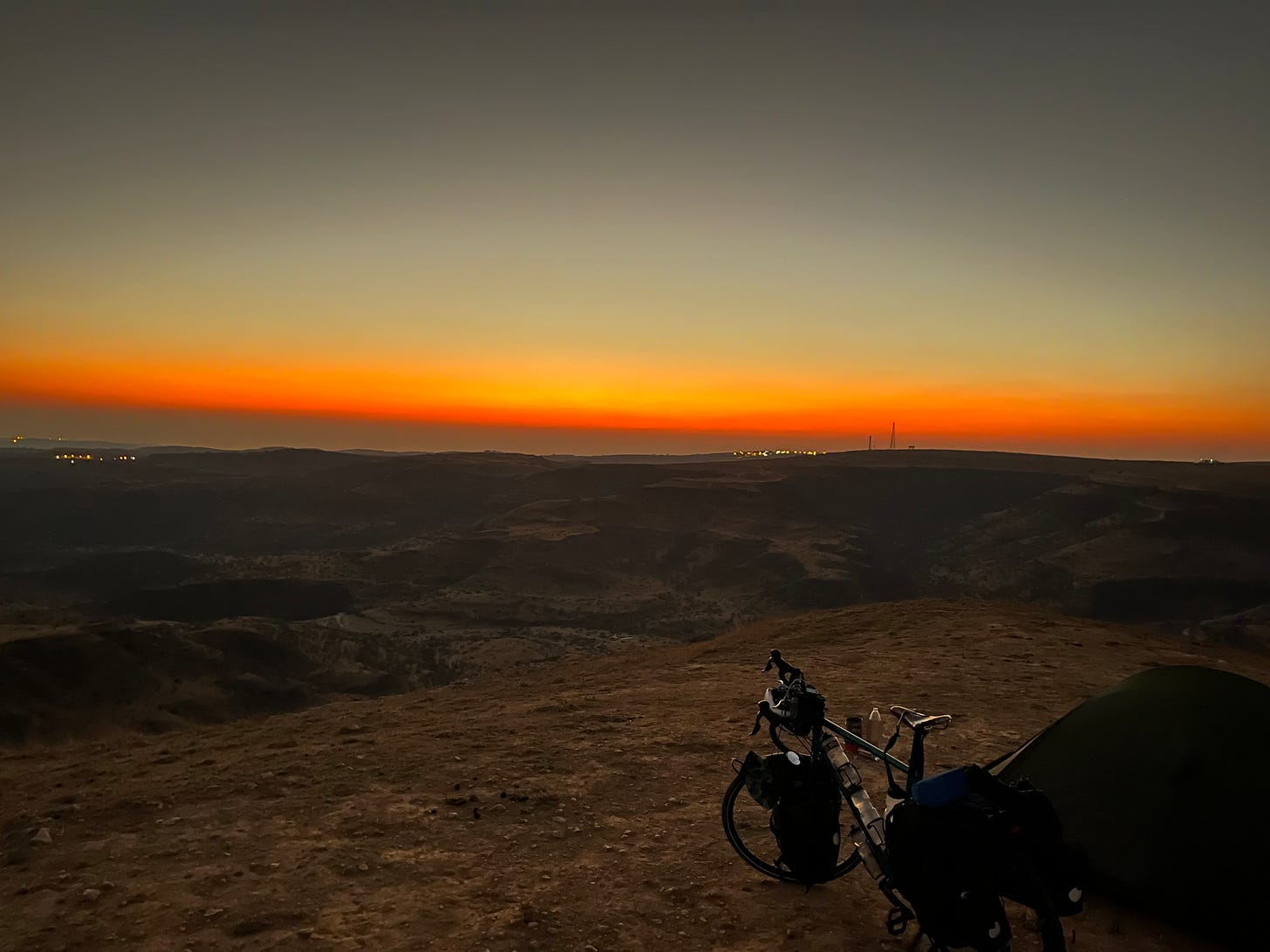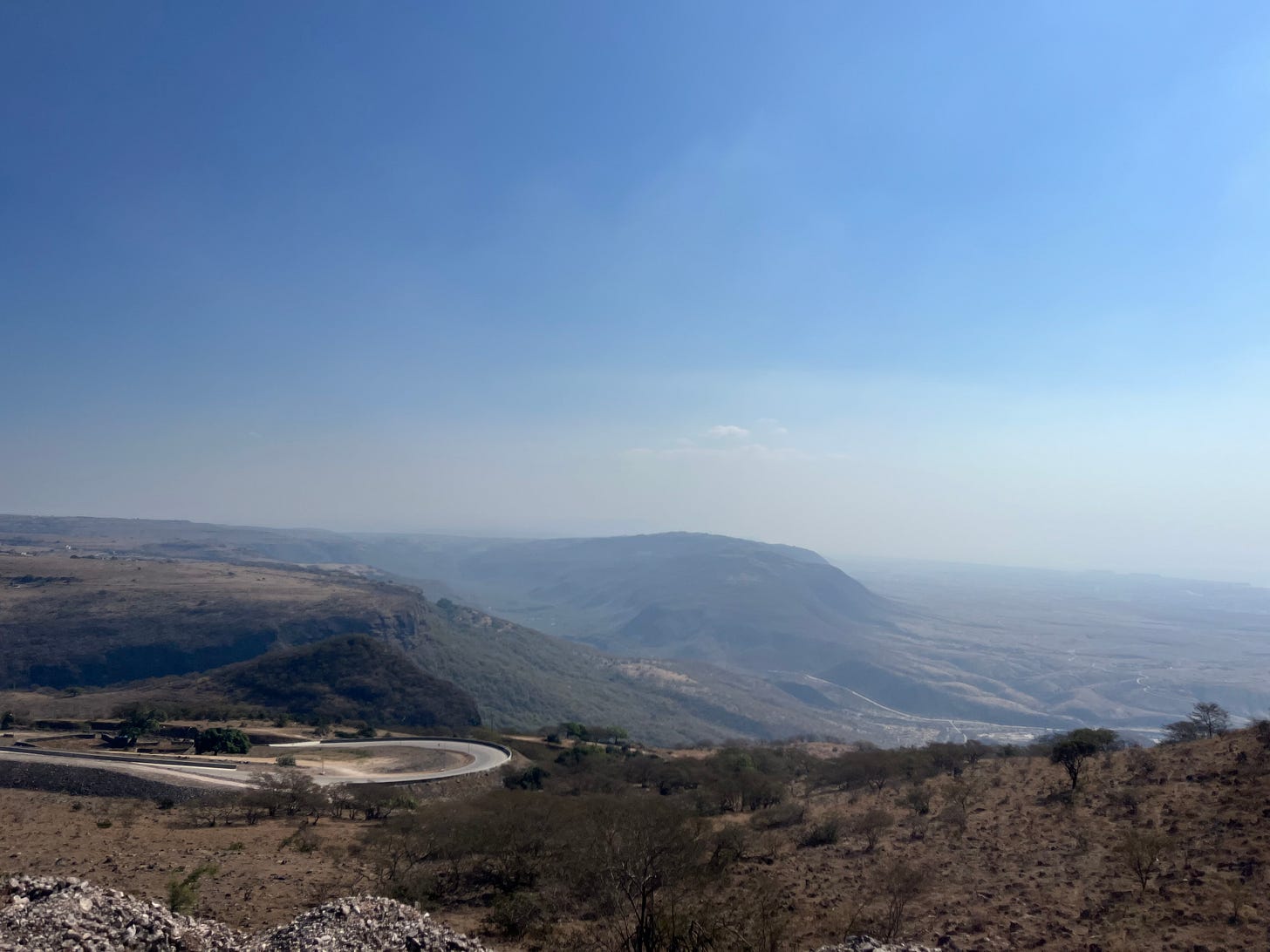168 | How to live in fear
Taqah, Oman
Today, I am writing from the shore of the Arabian Sea. On Monday, I called the Riyadh bus service for direct buses to Dubai. Flummoxed by my query, the bus service said they hadn’t yet drafted the timetable for 2024. Hmmpff, I thought. Then I was politely advised to wait indefinitely — had they not foreseen the new year?! Perhaps it was a sign. Later the same day, a friend suggested I go south, to Oman. Flights were wonderfully convenient — and cheap — so I packed and boxed and did that absurd spin-wrapping with cling film, and flew to Salalah on the hot Omani coast. I’ll now make my way east over the mountains and through the desert to Muscat. There are some 2,200km ahead of me, into 60km/hr headwinds (surely the forecasters are wrong…). I’ll wild camp a lot. Am I scared? I certainly was, when I first set off — and that’s my admission for this week.
I'm now well into this trip and ready to admit that saying goodbye to my job, my flat and my friends scared me.
From the moment I decided to go cycling (in the pub with Monty), there was a burst of activity: informing customers at work, buying a bicycle, assembling it, and finally peddling off. Often I took a breath and said to myself, 'Ohhhhh shit, here we go, into the unknown…'
I didn't fear the physical challenge, nor setting camp in the wind, nor the diet of pasta pesto. What was it, then? Why did my heart race and my breath get shallow?
I didn't realise it then, but I feared change. I feared not knowing what was going to happen. And this, beneath it all, is what fear represents.
Come to think of it, I've always felt a little fearful when I've gone through change. I felt the same fear when quitting my job; I felt it when starting Otto and then shutting down that dream. I felt fear when we got traction with Yokeru as the idea became a reality. I felt the fear when moving to Nairobi. A blinding flash of ‘HEEECCKKK!!’
And each time, I've come to terms with it through rationalising it — wrestling it to the ground — in weekly therapy. I thought I would share some of my rationalisations here, to save you money and the cruel terror of introspection.
Fear is not knowing what comes next. The first horror film I watched and understood was The Grudge. According to Rotten Tomatoes, the film fails to deliver "much in the way of logic or truly jarring scares." Well, it terrified me. I can still smell the six of us — at twelve years old — crammed into a study at school on a hot summer day, sweating under our polyester button down shirts and covering our eyes. Horror relies on suspenseful music to manufacture unease in a scene. There is a suggestion something sinister might happen, and the screen gets darker and gloomier. The scene becomes opaque; our predictions more dreadful. After all, horror is about prediction, and we become more fearful when we can't see the future. We come to terms and enjoy the rhythmic beating of our routine. When it's challenged and upset, we get in a spin. Consequently, we hold on to our routines and habits because we know them, like some cosmic life raft.
It's simply The Unknown which we are worried about: not the action (starting a business, leaving our job) that concerns us. In fact, when we peel back this illusion, getting excited about the change is straightforward. "Right, so I know I want to go cycling," you might mull, "and I just don't know how it will feel to leave my job." In that moment, your burden is a little lighter.
Most of our decisions (short of having children) are reversible. Yes, we might leave a job, but we can get another similar one. Relationships can (mostly) be returned to, albeit it is an awkward conversation. We can always book return tickets and fly home. A startup can be closed down and a partnership terminated. I started a retirement home development business, for which I was not suited (too young and inexperienced). With limited elegance, and buckets of unnecessary shame, I reversed out of it. Life is long, people have short memories, and we have the potential to live many lives. We can, therefore, afford to make mistakes, and if we are not making mistakes, we're probably not living at our limit; we're not on the leading edge of what's possible.
If you're uncomfortable, you're growing. If you're reading this, the chances are you have life pretty good. Therefore, the discomfort you feel is an opportunity to grow. I was unhappy with my public speaking performances for years, so I attended Toastmasters. On stage, I learned that it was okay to feel discomfort. In fact, amid a presentation, it's okay to pause, refocus, and recognise that just by feeling uncomfortable, you're becoming a better speaker — just by holding it together in that moment. Similarly, the discomfort of change is a sign of growth; it's not actually pain. It's like lifting weights or pushing through a very long book.
But sometimes these frameworks fail me. I still succumb to fear, and my feet turn cold. In those moments, I turn to Thomas Nagel's observation that, on any meaningful timescale (of, say, a million years), 'we will all be dead any minute.' Therefore, we must do the most interesting thing with our vanishing second. And it's always interesting to walk over the hot coals of uncertainty and surrender to whatever happens next.
My week in books…
Read:
The Art and Business of Online Writing by Nicolas Cole. While we have very different writing styles, some brilliant points are made. Firstly, don’t have a blog but post on social media: blogs are rubbish for feedback and distribution. Second, be prolific and consistent. He writes a post a day and has done so for years. Third, titles matter. Recommended for those who want to write online (hence the apt title of his book, you see).
One Blade Of Grass: Finding the Old Road of the Heart, a Zen Memoir by Henry Shukman. Beautifully written, spiritually delicious. Shukman has a spiritual awakening but doesn’t realise it. Years later, he transformed his life with meditation. Excellent read for those who enjoy terrific writing.
Reading: Stalin: Paradoxes of Power by Stephen Kotkin. A Distant Mirror by Barbara Tuchman. A Moveable Feast by Ernest Hemingway.
Live well,
Hector




